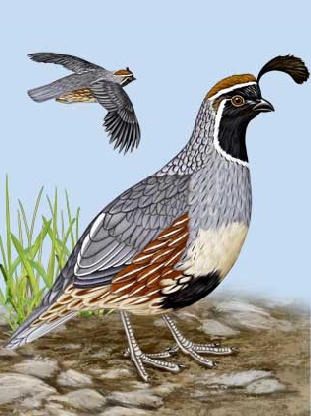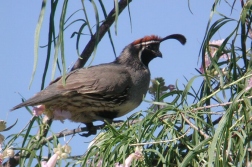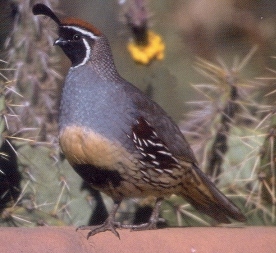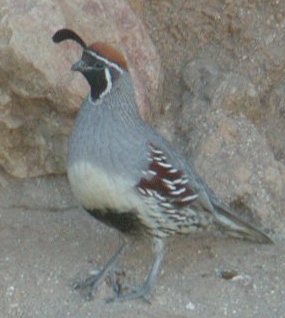|

Medium quail, gray upperparts and breast, scaled gray nape, black patch
on center of abdomen, black head plume, white-bordered black face, cinnamon-brown
crown, buff underparts, flanks streaked dark chestnut-brown and white.
Alternates several stiff wing beats with short glides.
The male Gambel’s Quail has gray upperparts and breast, a black
patch on the center of the abdomen, black head plume, black-and-white
face, cinnamon crown, buff underparts, and streaked chestnut flanks.

|
GAMBEL'S
QUAIL
Callipepla gambelii
GALLIFORMES
Quails (Odontophoridae)
Range and Habitat
Gambel's Quail: Resident in the Sonoran desert of Arizona and Mexico,
extending into southern New Mexico, up and down the Rio Grande, up the
Colorado River drainage into Utah’s canyon country, and west to
California and southern Nevada.
Preferred habitats include brushy and thorny vegetation of southwestern
deserts.
SOUND: "quoit", "oit", "chi-CA-go-go"
Although the Gambel's Quail is adapted to living in a dry, desert environment,
it reproduces best in years with adequate rainfall.
They are a non-migratory species and are rarely seen in flight. Any
flight is usually short and explosive, with many rapid wingbeats followed
by a slow glide to the ground.
This quail was named for William Gambel, the American naturalist and
collector.

A group of quails has many collective nouns, including a "battery",
"drift", "flush", "rout", and "shake"
of quails.
The Gambel's Quail is rated at this time as Least Concern. This rating
was previously Lower Risk. The population and range of Gambel's Quail
are both sufficient enough at this time to warrant a Least Concern rating.
This bird is native to the United States and Mexico. The range of this
bird is estimated at around half a million kilometers. The population
of Gambel's Quail is around 2 million individual birds. The population
of this bird species is considered to be stable enough at this time
that there are not any dangers regarding immediate population decline.


|